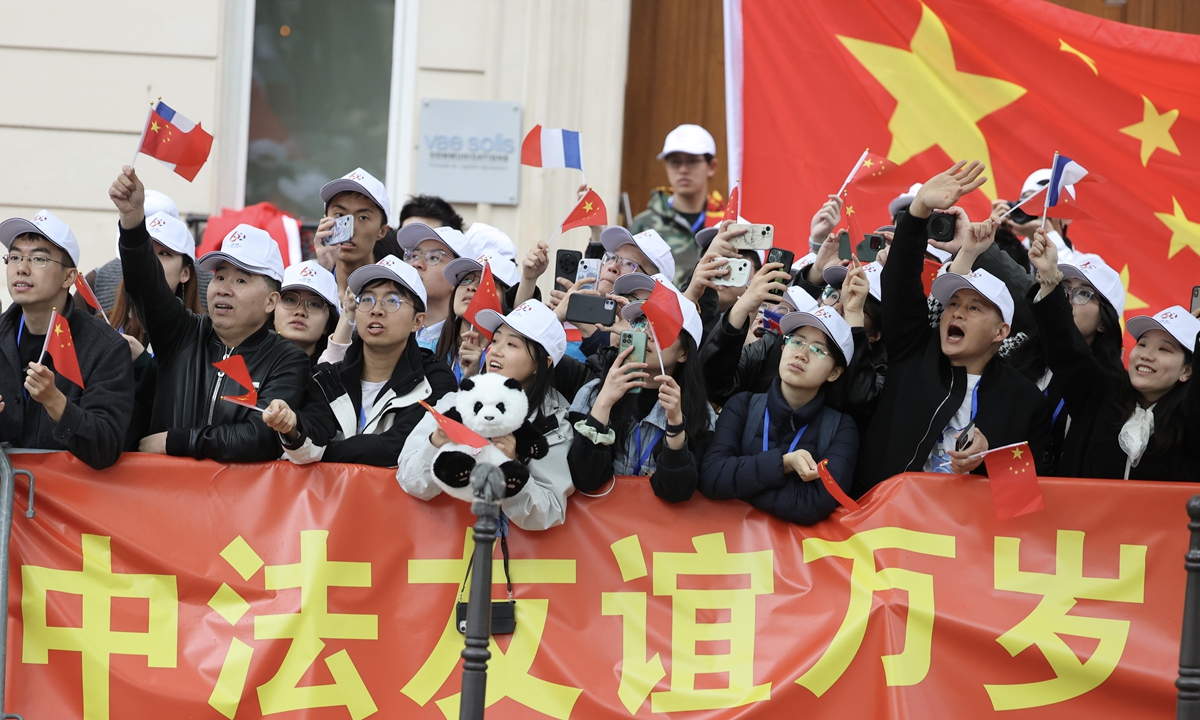China-France relations can serve as an inspiring example for East-West ties: French scholar

On the streets of Paris, overseas Chinese and Chinese international students hold high a red banner that reads "Long live the friendship between China and France," waving the flags of both countries and warmly welcoming Chinese President Xi Jinping's visit on May 5, 2024. Photos: CNS photo
Editor's Note:
Chinese President Xi Jinping is currently visiting France, the first stop of his three-nation European trip. This year marks the 60th anniversary of the establishment of diplomatic relations between China and France. How will Xi's trip help boost China-France ties and China-Europe ties? How important is it to preserve the two sides' ability to engage in dialogue at the highest level? How to interpret the significance of frequent high-level interactions between China and France? Global Times (GT) reporter Wang Wenwen talked to Pierre Picquart (Picquart), a doctor in Geopolitics and Human Geography from the University of Paris-VIII, a writer, lecturer, specialist in China and international expert.
GT: What boost could Xi's trip give to bilateral relations? What do you expect from this trip?
Picquart: This high-level summit is expected to be a catalyst for innovative agreements and fruitful partnerships. In support of his peaceful and globally prosperous vision, Xi's visit to France is expected to foster a relationship that will shape the future of relations between China, Europe and France.
We must strengthen China-France relations toward a new era of cooperation. The 60th anniversary of diplomatic relations between China and France provides a remarkable opportunity to revitalize and enrich our bilateral ties. President Xi's trip to France takes on special significance, carrying with it the potential to breathe new impetus into our strategic partnership.
There are many expectations regarding the fruits Xi's trip could bear. First, on the economic front, this trip could pave the way for concluding trade agreements and promoting mutually beneficial investments. Cooperation in key sectors such as technology, innovation, energy and infrastructure could be strengthened, creating opportunities for economic growth and job creation in both countries.
Many challenges remain to be met on the international level to stop conflicts. We must do everything we can to fight against wars and poverty. Diplomatically, this visit provides an ideal platform to strengthen coordination and collaboration between China and France on major global challenges such as climate change, international security and public health. Consolidating our partnership in these strategic areas could help promote regional and global stability, while strengthening multilateralism and the rules-based international order.
In addition, on a cultural and educational level, this trip could open up new opportunities for cooperation in the fields of education, research and culture, thereby strengthening exchanges between our peoples and deepening their mutual understanding.
Xi's trip to France represents much more than just a diplomatic meeting. It offers a unique opportunity to consolidate and diversify our relationships, exploring new areas of cooperation and strengthening our partnership in a rapidly changing world.
GT: France was the first major Western country to establish formal diplomatic relations with China. Last year, French President Emmanuel Macron visited China, showing goodwill and advocating for European strategic autonomy. Out of all European countries, why was it France that made this decision?
Picquart: France and China have often been pioneers in the construction of diplomatic bridges. France's decision to establish formal diplomatic relations with China in 1964 was a historic act that paved the way for a strategic and friendly partnership between two nations with different cultures and political systems.
Several factors can explain this visionary choice on the part of France. First of all, France has a long tradition of diplomacy and openness to international relations. As a nation with historical influence on the global stage, France has often adopted a pragmatic and independent approach to its foreign relations, seeking to establish partnerships with a wide range of international actors, including those with different political systems.
Additionally, France has often sought to mediate international conflicts and promote dialogue and cooperation between nations. In the context of the Cold War, France adopted a policy of independence and non-alignment, seeking to maintain balanced relations with the world's major powers, including China.
In addition, early on, France recognized the economic potential of China as an expanding market and as an important trading partner. Since the 1960s, France has sought to develop its trade with China, recognizing its strategic importance in the context of emerging economic globalization.
Xi's visit demonstrates the importance that China attaches to its relations with France and Europe. By choosing France as the first stop on his European tour, President Xi is sending a strong message about the importance of China-Europe cooperation and his commitment to multilateralism and dialogue diplomacy. The visit is of particular significance in the context of China-Europe and international relations. It provides a unique opportunity to strengthen ties between China, France and Europe, promoting mutually beneficial cooperation and contributing to the stability and prosperity of the Euro-Asian region and beyond.
GT: Do you think that China-France relations can become a model for East-West relations?
Picquart: France is influential within Europe and it can draw a new favorable model in China-Europe relations and within the framework of beneficial "East-West" cooperation. Like China, it is a permanent member of the UN Security Council. France has a diplomacy of realism and values. It occupies a strategic position within the EU and plays a significant role in relations between Europe and China. As one of the major economic and political powers, France can exert significant influence on how Europe interacts with China.
France has a long tradition of diplomacy and international relations, which gives it credibility and expertise in the management of global affairs. As a permanent member of the UN Security Council and a founding member of the EU, France is often seen as an influential actor on the international scene. Thus, it can play a leadership role within the EU regarding the policies to adopt toward China.
France maintains strong bilateral relations with China, based on mutual respect and cooperation in various fields. These close relations allow France to serve as a bridge between Europe and China, facilitating dialogue and cooperation between the two parties. France can thus promote a balanced and constructive approach in China-Europe relations, by highlighting common interests and seeking solutions to common challenges.
France is often seen as a model of cooperation between East and West, due to its commitment to multilateralism, dialogue diplomacy and the promotion of universal values. China-France relations can therefore serve as an inspiring example for relations between East and West, showing that it is possible to overcome ideological and cultural differences to build a mutually beneficial partnership. For this to be possible, it is essential that France continues to promote dialogue, cooperation and mutual respect in its relations with China, while defending its interests and fundamental values.
It is important to recognize that China-France relations are not without challenges and tensions. Differences in political systems, cultural values and economic interests can sometimes complicate bilateral relations. Additionally, rising global geopolitical tensions, particularly between China and some Western countries, may also impact China-France relations.
GT: Despite differences between China and France on trade and other issues, how important is it to preserve the two sides' ability to engage in dialogue at the highest level?
Picquart: This bilateral relationship extends far beyond their national borders, as this relationship has a significant impact on the global stage. Discussions between the leaders of these two great powers make it possible to manage disagreements and prevent potential conflicts. Additionally, they provide a platform to address issues of common interest such as climate change, trade and technological innovation.
Preserving this high-level dialogue is essential to promoting cooperation on critical issues, thereby contributing to regional and global stability. Despite differences, China and France also share common interests in many areas. Maintaining an open and constructive dialogue provides the opportunity to explore compromises and find mutually beneficial solutions.
Furthermore, preserving the ability of both parties to engage in dialogue at the highest level strengthens mutual trust and promotes deeper understanding between them. In the context of growing geopolitical tensions, this direct dialogue can help dispel misunderstandings and build more stable and constructive relations in the long term.
Both parties can identify areas of convergence and find solutions to problems. This dialogue thus makes it possible to prevent potential conflicts and promote stability in bilateral relations. This helps create an environment conducive to a more just, prosperous and peaceful world for future generations. This capacity for dialogue is not only crucial, but vital for building a more equitable, more prosperous and more peaceful world. By fostering the spirit of dialogue and cooperation, these two nations can chart a path toward a bright future for all of humanity.



